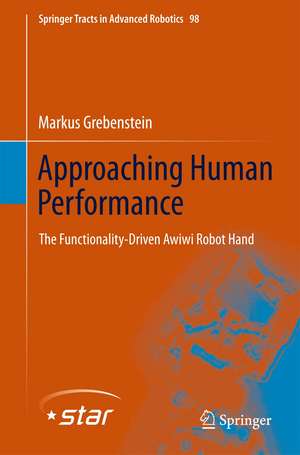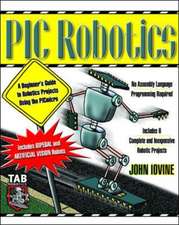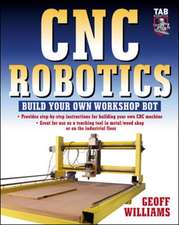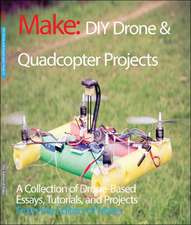Approaching Human Performance: The Functionality-Driven Awiwi Robot Hand: Springer Tracts in Advanced Robotics, cartea 98
Autor Markus Grebensteinen Limba Engleză Hardback – 7 feb 2014
Humanoid robotics have made remarkable progress since the dawn of robotics. So why don't we have humanoid robot assistants in day-to-day life yet? This book analyzes the keys to building a successful humanoid robot for field robotics, where collisions become an unavoidable part of the game. The author argues that the design goal should be real anthropomorphism, as opposed to mere human-like appearance. He deduces three major characteristics to aim for when designing a humanoid robot, particularly robot hands:
- Robustness against impacts
- Fast dynamics
- Human-like grasping and manipulation performance
Instead of blindly copying human anatomy, this book opts for a holistic design methodology. It analyzes human hands and existing robot hands to elucidate the important functionalities that are the building blocks toward these necessary characteristics. They are the keys to designing an anthropomorphic robot hand, as illustrated in the high performance anthropomorphic Awiwi Hand presented in this book.
This is not only a handbook for robot hand designers. It gives a comprehensive survey and analysis of the state of the art in robot hands as well as the human anatomy. It is also aimed at researchers and roboticists interested in the underlying functionalities of hands, grasping and manipulation.
The methodology of functional abstraction is not limited to robot hands, it can also help realize a new generation of humanoid robots to accommodate a broader spectrum of the needs of human society.
| Toate formatele și edițiile | Preț | Express |
|---|---|---|
| Paperback (1) | 637.78 lei 6-8 săpt. | |
| Springer International Publishing – 27 aug 2016 | 637.78 lei 6-8 săpt. | |
| Hardback (1) | 640.88 lei 6-8 săpt. | |
| Springer International Publishing – 7 feb 2014 | 640.88 lei 6-8 săpt. |
Din seria Springer Tracts in Advanced Robotics
- 18%
 Preț: 910.26 lei
Preț: 910.26 lei - 18%
 Preț: 893.71 lei
Preț: 893.71 lei -
 Preț: 445.98 lei
Preț: 445.98 lei -
 Preț: 406.43 lei
Preț: 406.43 lei - 13%
 Preț: 371.07 lei
Preț: 371.07 lei -
 Preț: 522.45 lei
Preț: 522.45 lei - 15%
 Preț: 640.88 lei
Preț: 640.88 lei - 18%
 Preț: 783.98 lei
Preț: 783.98 lei - 15%
 Preț: 641.74 lei
Preț: 641.74 lei - 15%
 Preț: 640.88 lei
Preț: 640.88 lei - 18%
 Preț: 994.72 lei
Preț: 994.72 lei - 18%
 Preț: 778.45 lei
Preț: 778.45 lei - 18%
 Preț: 730.35 lei
Preț: 730.35 lei - 18%
 Preț: 1233.83 lei
Preț: 1233.83 lei - 18%
 Preț: 951.47 lei
Preț: 951.47 lei - 15%
 Preț: 640.06 lei
Preț: 640.06 lei - 18%
 Preț: 1844.67 lei
Preț: 1844.67 lei - 15%
 Preț: 642.51 lei
Preț: 642.51 lei - 18%
 Preț: 1112.30 lei
Preț: 1112.30 lei - 15%
 Preț: 665.08 lei
Preț: 665.08 lei - 18%
 Preț: 947.85 lei
Preț: 947.85 lei - 15%
 Preț: 640.88 lei
Preț: 640.88 lei - 18%
 Preț: 776.88 lei
Preț: 776.88 lei - 18%
 Preț: 959.04 lei
Preț: 959.04 lei - 15%
 Preț: 659.02 lei
Preț: 659.02 lei - 15%
 Preț: 654.95 lei
Preț: 654.95 lei - 18%
 Preț: 973.38 lei
Preț: 973.38 lei - 5%
 Preț: 724.70 lei
Preț: 724.70 lei - 18%
 Preț: 981.49 lei
Preț: 981.49 lei - 18%
 Preț: 954.45 lei
Preț: 954.45 lei - 15%
 Preț: 641.53 lei
Preț: 641.53 lei - 15%
 Preț: 653.98 lei
Preț: 653.98 lei - 24%
 Preț: 814.81 lei
Preț: 814.81 lei - 18%
 Preț: 968.65 lei
Preț: 968.65 lei - 18%
 Preț: 970.70 lei
Preț: 970.70 lei
Preț: 640.88 lei
Preț vechi: 753.97 lei
-15% Nou
Puncte Express: 961
Preț estimativ în valută:
122.64€ • 128.63$ • 102.09£
122.64€ • 128.63$ • 102.09£
Carte tipărită la comandă
Livrare economică 01-15 aprilie
Preluare comenzi: 021 569.72.76
Specificații
ISBN-13: 9783319035925
ISBN-10: 3319035924
Pagini: 280
Ilustrații: XXXIV, 209 p. 164 illus., 133 illus. in color.
Dimensiuni: 155 x 235 x 22 mm
Greutate: 0.43 kg
Ediția:2014
Editura: Springer International Publishing
Colecția Springer
Seria Springer Tracts in Advanced Robotics
Locul publicării:Cham, Switzerland
ISBN-10: 3319035924
Pagini: 280
Ilustrații: XXXIV, 209 p. 164 illus., 133 illus. in color.
Dimensiuni: 155 x 235 x 22 mm
Greutate: 0.43 kg
Ediția:2014
Editura: Springer International Publishing
Colecția Springer
Seria Springer Tracts in Advanced Robotics
Locul publicării:Cham, Switzerland
Public țintă
ResearchCuprins
Analysis of the Current State of Robot Hands.-
Analysis of the Human Hand.-
The Awiwi Hand: An Arti cial Hand for the DLR Hand
Arm System.- Results.
The Awiwi Hand: An Arti cial Hand for the DLR Hand
Arm System.- Results.
Textul de pe ultima copertă
Humanoid robotics have made remarkable progress since the dawn of robotics. So why don't we have humanoid robot assistants in day-to-day life yet? This book analyzes the keys to building a successful humanoid robot for field robotics, where collisions become an unavoidable part of the game. The author argues that the design goal should be real anthropomorphism, as opposed to mere human-like appearance. He deduces three major characteristics to aim for when designing a humanoid robot, particularly robot hands:
- Robustness against impacts
- Fast dynamics
- Human-like grasping and manipulation performance
Instead of blindly copying human anatomy, this book opts for a holistic design methodology. It analyzes human hands and existing robot hands to elucidate the important functionalities that are the building blocks toward these necessary characteristics. They are the keys to designing an anthropomorphic robot hand, as illustrated in the high performance anthropomorphic Awiwi Hand presented in this book.
This is not only a handbook for robot hand designers. It gives a comprehensive survey and analysis of the state of the art in robot hands as well as the human anatomy. It is also aimed at researchers and roboticists interested in the underlying functionalities of hands, grasping and manipulation.
The methodology of functional abstraction is not limited to robot hands, it can also help realize a new generation of humanoid robots to accommodate a broader spectrum of the needs of human society.
Caracteristici
Addresses a wide range of topics in robotics through a new approach to an anthropomorphic robot, which can be extended to system design Presents functional analyses of both human and robotic hands, which forms the basis of the robot hand design and helps to distill a set of comprehensive guidelines for robot hand designers Proves that the kinematics designed using this approach achieve a new paradigm in grasp performance by matching full sets of well know grasp taxonomies










